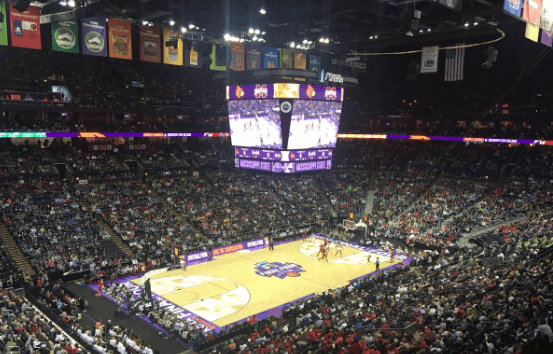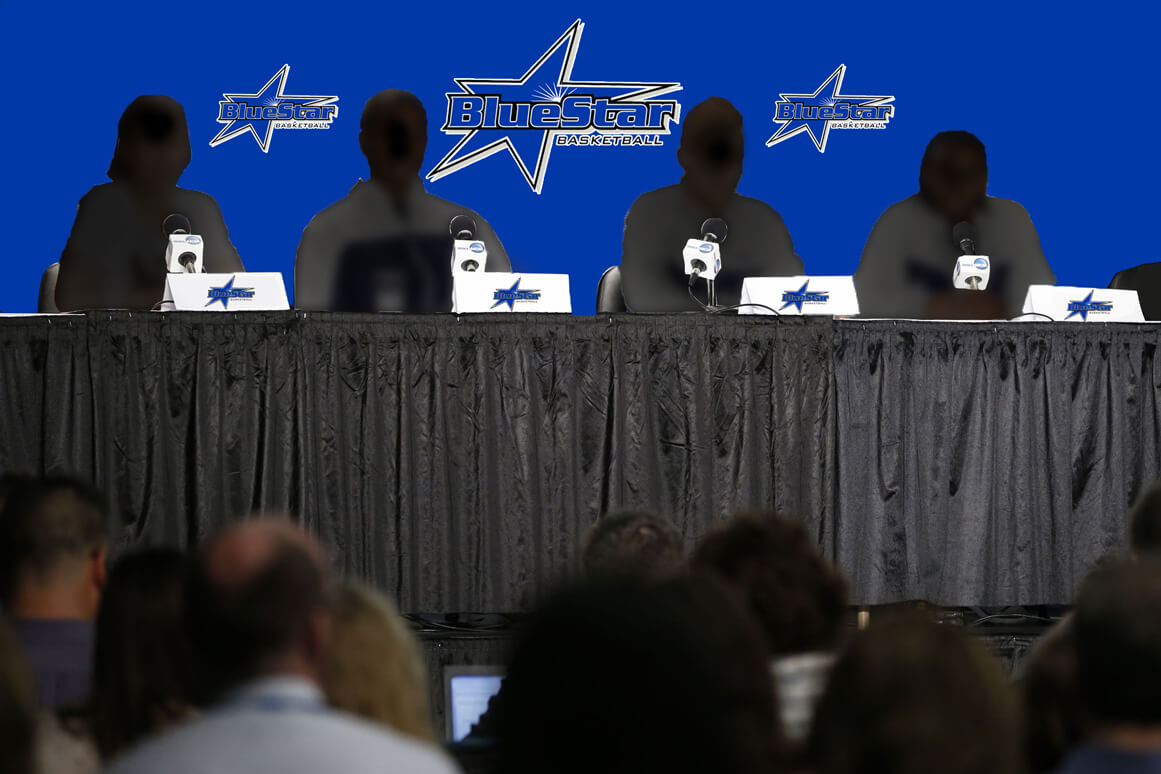
The view of the court at Nationwide Arena from the Blue Star suite.
I can’t get to sleep, and I have an Easter egg hunt in the morning that I may not make.
After nearly 30 years of following this sport, I’ve never seen a night like what happened in Columbus, Ohio, in the national semifinals.
Mississippi State beat Louisville 73-63 in overtime, as Teaira McCowan scored 21 points and pulled down a Women’s Final Four record 25 rebounds.
Yes. Twenty-five.
The six-foot-seven senior center for the Bulldogs was a decisive factor in her team’s return trip to the national championship game, and what her team did to get to overtime is worth a story on its own.
Especially with another senior, All-American Victoria Vivians, having already fouled out.
There was controversy, to be sure, that set up the final proceedings, and they deserve a closer look in calmer, less frantic times than the present.
The officiating was disgraceful at the worst times. Toward the end of regulation, Lisa Mattingly, usually one of the best referees in the game, called a common foul against Louisville’s Sam Fuehring guarding McCowan. Fuehring then slapped the floor in frustration.
The common foul was Fuehring’s fourth of the game, and Mattingly immediately slapped her with a technical foul for that outburst.
In the men’s game, this is Duke irritatingly playing a zone defense. In the women’s game, it was a fifth personal foul and disqualifcation for a key player in a national semifinal game.
Are you kidding me?
Louisville coach Jeff Walz, who had tossed a water bottle in disgust earlier in the game, didn’t have an answer to the giant in the paint.
It was a role player on the perimeter who sent the game into overtime, when Roshunda Johnson drained a three for Mississippi State and the Cardinals got cold in the extra session. They looked absolutely gassed. That Walz had a foul to give with a three-point lead and didn’t foul will be discussed in Kentucky for some time, but Mississippi State’s toughness—a hallmark of Vic Schaefer’s teams—was evident.
When you look at his daughter, Blair Schaefer, a charge-taker extraordinaire, absorb two brutal offensive fouls in the early going, and make it the rest of the way, that sums up what this coach has instilled in just a few years at a place that had absolutely no pedigree in this sport.
The program in this sport that has pedigree like no other entered the Women’s Final Four undefeated for the second year in a row and exited the same way as last year, on an astonishing last-second shot.
I have lived long enough to see this happen: Two years in succession, an undefeated UConn is eliminated on a last-second shot, in overtime.
A year ago, it was Mississippi State’s Morgan William. On Good Friday, it was Arike Ogunbowale, on a brilliant step-back jumper.
Notre Dame 91, UConn 89.
She gave the Huskies just enough time for one last shot, with a second left, and Katie Lou Samuelson’s short banking shot rattled off the rim at the final buzzer.
The depleted Irish, down to essentially five and a half players because of numerous ACL injuries, dug out an incredible win after taking a double-digit lead early, then falling behind by as much, and managing to survive UConn forcing OT.
On Sunday, it will be a Notre Dame program that won an NCAA title in 2001, also after rallying against UConn, against a Mississippi State team gunning for its first title, after coming up a game short against South Carolina a year ago.
While these have been very good UConn teams for Geno Auriemma, they haven’t been vintage. As the game wore on, you never got a sense that if the Huskies really needed a basket, you would know where that scoring would come from. Samuelson disappeared in the fourth quarter and overtime. Ogunbowale streaked up and down the court like a comet, igniting the Irish’s final comeback.
In nearly getting a technical foul—staved off by Chris Dailey, his longtime assistant—Geno exuded a frustration that may come back to haunt Huskies fans for some time.
That he’s been saying for a good while that the competitive balance at the top of the game is getting better needs to be heeded. There were no real upsets on Friday. That’s how closely matched these teams were.
The teams that gutted it out the longest, that were the most resilient and opportunistic, that made a final decisive play, have advanced.
So many pundits like to pontificate about what’s wrong for the game—UConn—but they seem to disappear when their convenient storyline disappears. Their absence from the hot takes portion of the Internet has been noticeable.
This may well have been the best batch of semifinal games yet at the Women’s Final Four ever, they’re certainly better than I’ve ever seen. Never before have both of them gone to overtime.
Sometimes you live long enough to be able to write about something as unlikely as all this.
Unless you fell on the wrong side a particular rooting interest, how could you not want to savor what transpired in the smack dab middle of Ohio on Friday?
Fans of Louisville and UConn obviously aren’t feeling this way. They’re beyond devastated. A shot or two here or there, a rebound or a loose ball that goes another way, and they’re meeting each other for the third time in an NCAA final since 2009.
UConn has gone 72-2 in the last two seasons, only to fall a game short of the national championship both times. Geno looked absolutely crushed, the pain on his face something many of us have not seen in quite a few years.
It’s far too soon to get any notion that UConn’s dynastic reign has plateaued. Two years in a row without an NCAA title might prompt some in the Nutmeg State to wonder. But this conjecture was also in the air after the Diana Taurasi era.
That interregnum lasted just three years, before Maya Moore arrived in 2007. There hasn’t been a season without UConn in a Final Four since. Kia Nurse and Gabby Williams are gone, but everyone else is back. Christyn Williams, the national high school player of the year from Arkansas, is coming in.
But for the moment, the Huskies have been brought back down to earth, as other stars are rising. They’ve made it look so easy all these years, but Friday night’s high drama revealed how very hard this has been to accomplish, year after year.
Wendy Parker is a sportswriter and web editor who has covered women's basketball since the early 1990s. She is a correspondent for Basketball Times and formerly covered women's and college sports, soccer and the Olympics at The Atlanta Journal-Constitution. She is the author of "Beyond Title IX: The Cultural Laments of Women's Sports," available on Amazon, and the creator of Sports Biblio, a blog about sports books and history.




